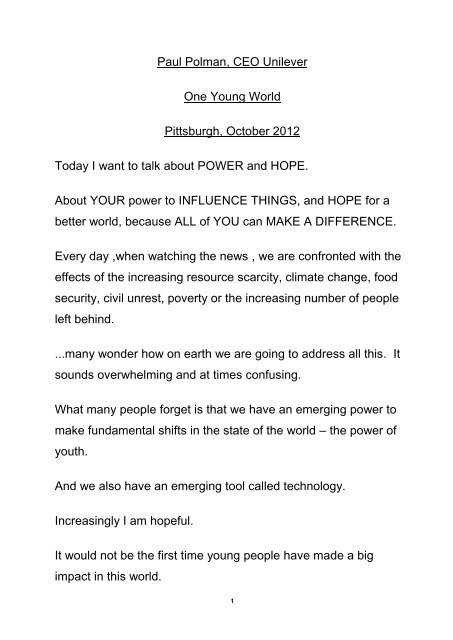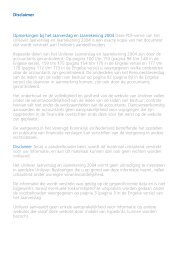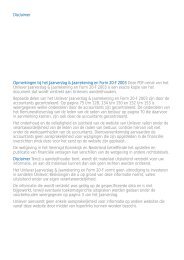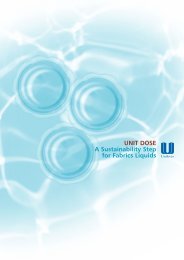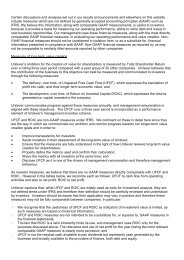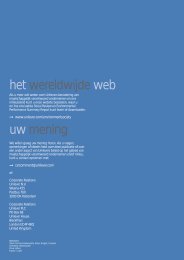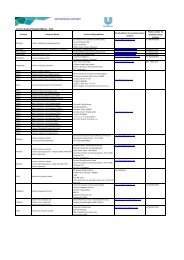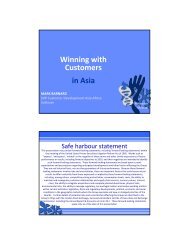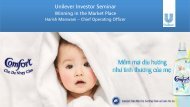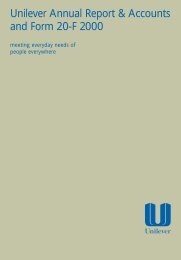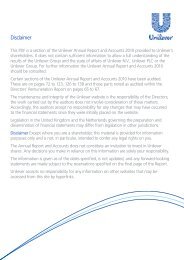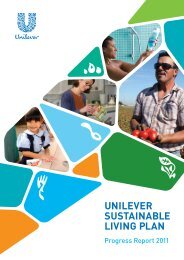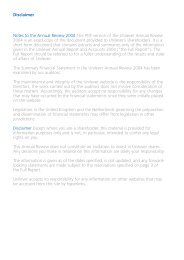Paul Polman, CEO Unilever One Young World Speech
Paul Polman, CEO Unilever One Young World Speech
Paul Polman, CEO Unilever One Young World Speech
Create successful ePaper yourself
Turn your PDF publications into a flip-book with our unique Google optimized e-Paper software.
<strong>Paul</strong> <strong>Polman</strong>, <strong>CEO</strong> <strong>Unilever</strong><br />
<strong>One</strong> <strong>Young</strong> <strong>World</strong><br />
Pittsburgh, October 2012<br />
Today I want to talk about POWER and HOPE.<br />
About YOUR power to INFLUENCE THINGS, and HOPE for a<br />
better world, because ALL of YOU can MAKE A DIFFERENCE.<br />
Every day ,when watching the news , we are confronted with the<br />
effects of the increasing resource scarcity, climate change, food<br />
security, civil unrest, poverty or the increasing number of people<br />
left behind.<br />
...many wonder how on earth we are going to address all this. It<br />
sounds overwhelming and at times confusing.<br />
What many people forget is that we have an emerging power to<br />
make fundamental shifts in the state of the world – the power of<br />
youth.<br />
And we also have an emerging tool called technology.<br />
Increasingly I am hopeful.<br />
It would not be the first time young people have made a big<br />
impact in this world.<br />
1
Alexander the Great became king of Macedon when he was 20.<br />
By the time he was 30, he had created one of the largest empires<br />
of the ancient world. Undefeated in battle, he is considered one<br />
of history's most successful commanders.<br />
Joan of Arc led the French army in the siege of Orleans aged 19.<br />
And yes, she was a woman.<br />
Christabel Pankhurst, another woman, was 23 when she co-<br />
founded the movement that led to votes for women in the UK.<br />
In more recent times, Richard Branson founded the Virgin Group<br />
at 20, Steve Jobs founded Apple at 21, Mark Zuckerberg set up<br />
Facebook aged 20.<br />
What these people have in common is not that they were<br />
outstandingly gifted, or even well educated.<br />
They all share a passionate belief in their cause.<br />
They all started a movement or a network that others were<br />
inspired to join, and all were committed to building a different kind<br />
of future. A passion for a better world based on dignity and<br />
respect for the common good. A passion simply to make a<br />
lasting difference.<br />
2
This power of people to change the world has multiplied<br />
dramatically since digital technology started to connect us all.<br />
And the young, like yourselves, get it. That's the good thing.<br />
Earlier this month, Facebook announced it passed the 1 billion<br />
users. 2.2 billion people are now connected to the Internet ( 33%<br />
of world population ) and an awesome 1.5 billion use social<br />
networks. YouTube now has 800 million unique visitors a month<br />
and Twitter has over 140 million active users. Together they<br />
have helped to galvanise people, organise their activities and<br />
broadcast their actions to the world. By 2030 we will have 50<br />
billion connected devices.<br />
Its happening as we speak.<br />
Social media has enabled some of the most dramatic movements<br />
of the last few years, from the Arab Spring to Occupy Wall St to<br />
the London riots. In Egypt, it took just 17 days to overthrow the<br />
regime.<br />
So, social media is enabling a shift of power to ordinary people,<br />
who are increasingly using it to challenge a system they feel does<br />
not always fairly work for them. That is what lay at the roots of<br />
Occupy Wall Street, the Arab Spring and other movements.<br />
But too often challenge ends only in destruction or conflict.<br />
3
It might bring down the old system but it doesn’t always build a<br />
better one.<br />
I want to applaud your enthusiasm and commitment – and<br />
acknowledge your generation's skills in the digital and social<br />
world - but more importantly, I want to challenge you.<br />
To challenge you to be the generation that remakes capitalism.<br />
To make it a better system.<br />
Winston Churchill once said that democracy is the worst form of<br />
government, except for all the other ones invented. The same<br />
can be said about capitalism. Yes, it has lifted over half a billion<br />
people out of poverty over the last two decades, provided<br />
education, technology and more. But increasingly we also see its<br />
shortcomings. Even more so after the 2008 financial crisis.<br />
We have a unique opportunity to make it work.<br />
I want to challenge you. Not through barricades or placards, but<br />
from the inside, creating a better way for business to do business.<br />
To use digital and social media to start new business models and<br />
inspiring social movements, in ways that create opportunities for<br />
others to get involved and drive positive social change. To be<br />
part of a movement.<br />
4
I have always been fascinated by the power of youth – who, by<br />
the way, are 50% of the population in emerging markets and<br />
100% of its future population. It’s one of the many things that<br />
attracted me to <strong>One</strong> <strong>Young</strong> <strong>World</strong>. I have three boys myself, all<br />
in their twenties. Yet we don't always harness that power, and<br />
too often we exclude many of the young from the most important<br />
issues.<br />
Let me give you two examples of extraordinary young people who<br />
are changing things.<br />
Jamal Edwards is a 15 year old teenager in London, England,<br />
who has turned his hobby into one of the UK’s leading youth<br />
media channels – from his bedroom.<br />
Here’s his story.....<br />
Jamal Edwards is a great example of how a good social idea,<br />
cleverly executed can not only create success for you as an<br />
individual, but create a following and generate employment.<br />
Another example I like is based here in the US.<br />
It’s a not-for-profit organisation called Carrotmob and was<br />
founded in 2008 by another young guy called Brent Schulkin.<br />
5
It works on the flashmob principle but, instead of boy-cotting<br />
products you don’t like, it encourages people to buy-cott products<br />
that make a positive difference.<br />
They have run over 250 campaigns where people have voted<br />
with their wallets at local stores that are prepared to make<br />
environmental commitments.<br />
Earlier this month, <strong>Unilever</strong> announced a partnership with<br />
Carrotmob to explore ways to take this idea and scale it up to<br />
bigger brands to make an even bigger difference.<br />
I like Carrotmob because it’s all too easy to protest about what<br />
you don’t like, but so much more productive to vote with your<br />
money for positive change.<br />
So if we can use our collective power to introduce democracy<br />
instead of autocracy, and reward good behaviour instead of<br />
punish bad behaviour then just imagine what we can achieve if<br />
we apply the same approach to solving some of the world’s<br />
biggest social and environmental challenges.<br />
Because the world needs our help.<br />
Last year at <strong>One</strong> <strong>Young</strong> <strong>World</strong> I talked about living in a volatile,<br />
uncertain and complex world.<br />
6
I spoke about a failure of political will to tackle some of the world’s<br />
big challenges, and about the need for a more sustainable and<br />
equitable world.<br />
<strong>One</strong> year on and not much has changed. You could argue it's<br />
worse.<br />
The world is still in the grip of economic volatility and political<br />
uncertainty. The Euro problem is now starting to affect other<br />
regions.<br />
The toppling of oppressive regimes in Egypt and Libya has not<br />
been followed by stability in the Middle East. The Syrian tragedy<br />
is becoming a daily TV show.<br />
Financial and fiscal measures taken by banks and governments<br />
have not stimulated growth. Libor scandals have further<br />
undermined trust.<br />
And governments continue to fail to make progress on<br />
international trade and climate change. The Rio+20 Declaration<br />
was disappointing.<br />
As a consequence, unemployment and, in particular youth<br />
unemployment, remains unacceptably high.<br />
7
In many countries between a third and half of all young people<br />
cannot find jobs and are increasingly disengaged from the<br />
process. With 50% plus unemployment in Southern Europe, we<br />
even risk a challenge to democracy. As one of our young leaders<br />
here told me, how can you love this world if you have huge<br />
college loans, cannot afford housing and find it difficult to get a<br />
good job?<br />
<strong>Young</strong> people themselves are crying out for change – and want to<br />
be part of the solution. Take a look at this short film, ‘A Date with<br />
History’, put together earlier this year by young people from all<br />
over the globe demanding change ahead of the Rio+20 Summit,<br />
which I attended in Brasil this year.<br />
{Film....1’ 30 }<br />
As Brittany Trilford the 17 years old from New Zeeland said;<br />
"I want a future where leaders will stop talking and start acting.<br />
Where we run with natural resources and not against them. “<br />
Don’t we agree?<br />
With 1 billion people going to bed hungry every night, 6 million<br />
children under 5 dying every year from preventable diseases, and<br />
over 2.5 billion people without access to basic sanitation or clean<br />
water, we have our work cut out.<br />
8
We have to find ways to grow our economies and provide people<br />
with a decent standard of living within an increasingly resource-<br />
constrained world<br />
I believe if we all work together we can do this. That is why I<br />
accepted an invitation from the UN Secretary General to become<br />
a member of the High Level Panel looking at the post-2015<br />
Development Goals.<br />
That’s also why, over two years ago, we announced <strong>Unilever</strong><br />
would find a new way of doing business, one that decouples<br />
business growth from environmental impacts and moves to a<br />
more sustainable and equitable model. A business model where<br />
we give versus take from society .<br />
After all, I don’t believe business can be a mere bystander in a<br />
system that gives it life.<br />
Our premise is that, as we grow our business and as we increase<br />
our positive social impacts, more consumers will embrace us,<br />
allowing us to have an even greater positive social impact. It’s a<br />
virtuous circle.<br />
We are doing this not just because it makes good business<br />
sense, but because it simply is the right thing to do.<br />
9
It cannot be right that 1 billion people go to bed hungry, that 1 in 3<br />
children in developing countries are malnourished, or that every<br />
day 16,000 children die of hunger. That’s the equivalent of 40<br />
Boeing 747's full of children crashing every day.<br />
That’s why in <strong>Unilever</strong> we are putting so much emphasis on<br />
working with smallholder farmers to help them grow their crops<br />
sustainably and provide our Knorr brand with better quality more<br />
nutritious products. That’s also why we are leading the global<br />
Foodsecurity taskforce for the B20.<br />
It cannot be right that 1 billion people do not have access to safe<br />
drinking water, or that 2.5 billion people do not have access to<br />
basic sanitation, or 3000 children under the age of 5 die EVERY<br />
DAY from diarrhoea or other infectious diseases. That's another<br />
8 Boeing 747's.<br />
At least half these deaths can be prevented simply by washing<br />
hands with soap and through access to clean, safe drinking<br />
water.<br />
That’s why, under the <strong>Unilever</strong> Sustainable Living Plan, we made<br />
a commitment to help 1 billion people adopt good hygiene habits<br />
by washing their hands with soap at key times of the day. Our<br />
Lifebuoy brand has already helped millions of children in South<br />
Asia and Africa.<br />
10
On Monday we signed a partnership in New York with the Earth<br />
Institute to bring handwashing with soap to 500,000 people in 80<br />
rural villages across 10 countries in Africa as part of their<br />
Millennium Villages Project. A million people pledged on<br />
Facebook and 250 million people joined us globally in over 100<br />
countries. The power of the web. And guess what? Most of this<br />
work on hand washing in the company is done by wonderful<br />
people in their twenties.<br />
Increasingly the power of social networks is clear to all of us. See<br />
what happened to Netflixs or BoA when they tried to put up rates.<br />
See the power of Change.org here in the US. See the 2 billion<br />
people participating in Earth day.<br />
Consumers are discovering the power of the net to drive change.<br />
In June we announced a partnership with Facebook and the<br />
global health organisation PSI called Waterworks and our Pure-it<br />
water brand. This leverages the power of the social graph on<br />
Facebook to connect ‘people with means’ to ‘people in need’ so<br />
that, through lots of people making micro-donations, we can get<br />
more safe drinking water to more people.<br />
Waterworks is being tested at the moment and, if all goes well,<br />
we will launch it next year. With a billion Facebook users we<br />
have high hopes of making a big impact.<br />
11
Helping a billion people improve their lives is a big target, and we<br />
still have a way to go.<br />
We are determined to achieve it and we are working with partners<br />
like UNICEF, Save the Children, PSI, the <strong>World</strong> Food Programme<br />
and Oxfam to help us get there.<br />
But we need YOUR help to get to scale.<br />
Together we can remake capitalism into a force for good by<br />
creating a positive connection between what we make and how<br />
we make it, and what you buy and how you use it.<br />
I want to show it is possible to do well and do good on a mass<br />
scale.<br />
I want to show that big doesn’t have to be bad and that it’s not<br />
only small that’s beautiful.<br />
I want to show that yes , even big companies , can be a force for<br />
good , not evil.<br />
Take Ben & Jerry's. They have championed social and<br />
environmental causes and given those causes a voice in<br />
mainstream culture.<br />
Take Dove's women's self esteem. They got 250 million<br />
impressions behind their latest social campaign.<br />
12
Imagine what <strong>Unilever</strong> could do with 2 billion people buying and<br />
using our products every day. With a company the size of<br />
<strong>Unilever</strong>, there is an enormous multiplier effect we can leverage.<br />
Every small choice someone makes, when multiplied by <strong>Unilever</strong>,<br />
can make a big difference.<br />
We believe if we work together to make better choices, we can<br />
transform everyday living into a powerful force for change.<br />
The choices may seem small … using a concentrated laundry<br />
detergent instead of an ordinary liquid one, washing your hands<br />
with soap or making a cup of Rainforest Alliance certified tea …<br />
but when multiplied by the power of YOU and <strong>Unilever</strong>, they<br />
move us one step closer to a sustainable future.<br />
So our task is to transform the impact of the everyday actions we<br />
do without thinking, into a conscious collective movement of good<br />
choices.<br />
I have a vision of all of our brands being a force for good, with<br />
each having over a billion fans or more to help drive change.<br />
Brands like Dove, Ben & Jerry’s , Lifebuoy, Knorr or Domestos, to<br />
name a few.<br />
I envision a 21 st century form of business, where the everyday<br />
consumer is helping to shape the social contract, moving from a<br />
value-based transaction to a values-based partnership.<br />
13
But, as I have said, we cannot do this alone.<br />
We already work with governments and have many partnerships<br />
with NGOs.<br />
But if we all act to address these issues ... business,<br />
governments, NGOs and citizens, especially the young …. just<br />
imagine the good we could create.<br />
So we not only need your help. We need your enthusiasm,<br />
ambition, drive and ideas.<br />
That’s why I’m delighted that in the Global Health breakout<br />
session later today this is something you are going to brainstorm.<br />
We certainly welcome your ideas.<br />
A year ago, you inspired me when I met you at <strong>One</strong> <strong>Young</strong> <strong>World</strong>.<br />
I was impressed with the achievements of many young leaders.<br />
People like Ajarat Bada or Erin Schrode and others. Erin's<br />
Schoolbag Program in Haiti and her ‘Teens Turning Green’<br />
initiative are great examples of what a young person with<br />
imagination, energy and commitment can do.<br />
14
After the summit I met Erin in New York to discuss her latest<br />
initiative, Project Green Challenge. She launched this just two<br />
weeks ago and already has over one million people signed up to<br />
lead more sustainable lifestyles. The power of passion and<br />
technology.<br />
I am also inspired by the Ambassadors from <strong>Unilever</strong>.<br />
I hesitate to single any of them out because they are all doing<br />
great things. But let me tell you about one, James Inglesby, who<br />
works in Research & Development.<br />
James wanted to come up with a sustainable sanitation solution<br />
for people in some of the poorest parts of the world leveraging<br />
our Domestos brand.<br />
He used innovative ideas from around the world – including<br />
crowd sourcing through OpenIdeo - and a public-private<br />
partnership model, to develop a low-cost, in-home toilet for those<br />
where there is no sanitation infrastructure.<br />
The toilet he developed - ‘the Uniloo’ - not only provides good<br />
sanitation, it creates jobs in the community.<br />
We’ve been testing the Uniloo in Ghana and, following a<br />
successful pilot, James is on his way to Nigeria to work in our<br />
business there and take the project to the next level.<br />
15
After last year’s summit, our Ambassadors created their own<br />
<strong>Young</strong> Leaders Sustainability Network inside <strong>Unilever</strong>. They<br />
developed a site on <strong>Unilever</strong>’s global intranet and crowd-sourced<br />
ideas from other young people in our business.<br />
They built and refined their ideas, voted on the ones they felt<br />
could make the biggest difference and then shared them with the<br />
business. We’re now looking to integrate their thinking even<br />
more strongly into the work of our business and brands.<br />
This shows what can be done if young people as a group are<br />
given a voice.<br />
So I am delighted to see you have not only chosen seven topics<br />
to discuss, but that you are linking these to pledges for small<br />
actions for positive change in your communities and businesses.<br />
Our future is, quite literally, in our hands. It is down to all of us.<br />
So although the world faces enormous social, economic and<br />
environmental pressures, I am optimistic about the future.<br />
I am optimistic because your generation understands the need for<br />
sustainable living in a way that older generations, brought up<br />
during a time of abundance, don’t.<br />
16
I am optimistic because your generation knows more than any<br />
other how to use social media to create cross-border<br />
communities of people committed to taking action to support the<br />
same ideals.<br />
I am optimistic because many of you are already having or want<br />
to have a bigger responsibility in driving this change. After all,<br />
18% of college graduates now want to work for Teach for<br />
America in this country. Not GS, City or other financial<br />
institutions.<br />
I am optimistic because of the sheer power of change<br />
represented in this room alone.<br />
You know how to harness the power to make positive things<br />
happen, not just to protest against what’s wrong.<br />
Today over half the world’s population is under 30. In some<br />
countries the figure is more like two-thirds.<br />
This gives me hope. There is a new, more entrepreneurial spirit<br />
among today’s young people<br />
You, in this room, have the opportunity, the responsibility and<br />
duty to be that catalysts for change. You all have the potential to<br />
be leaders and change-makers. Many of you are already.<br />
17
To paraphrase a line by the great British playwright George<br />
Bernard Shaw, and made famous by the US politician Robert F.<br />
Kennedy:<br />
“Some people see the world as it is and ask: what can I do?<br />
<strong>Young</strong> people see the world as it could be and say: together we<br />
can.”<br />
Thank you very much. I love you.<br />
18


